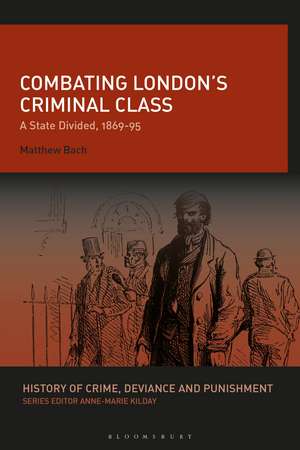Combating London’s Criminal Class: A State Divided, 1869-95: History of Crime, Deviance and Punishment
Autor Matthew Bachen Limba Engleză Paperback – 26 ian 2022
| Toate formatele și edițiile | Preț | Express |
|---|---|---|
| Paperback (1) | 196.79 lei 6-8 săpt. | |
| Bloomsbury Publishing – 26 ian 2022 | 196.79 lei 6-8 săpt. | |
| Hardback (1) | 597.37 lei 6-8 săpt. | |
| Bloomsbury Publishing – 5 aug 2020 | 597.37 lei 6-8 săpt. |
Din seria History of Crime, Deviance and Punishment
- 30%
 Preț: 509.52 lei
Preț: 509.52 lei - 13%
 Preț: 238.01 lei
Preț: 238.01 lei - 13%
 Preț: 257.50 lei
Preț: 257.50 lei - 13%
 Preț: 257.68 lei
Preț: 257.68 lei -
 Preț: 259.72 lei
Preț: 259.72 lei - 22%
 Preț: 224.41 lei
Preț: 224.41 lei - 22%
 Preț: 256.49 lei
Preț: 256.49 lei - 13%
 Preț: 256.20 lei
Preț: 256.20 lei - 20%
 Preț: 220.22 lei
Preț: 220.22 lei - 21%
 Preț: 216.62 lei
Preț: 216.62 lei - 23%
 Preț: 197.59 lei
Preț: 197.59 lei - 23%
 Preț: 191.85 lei
Preț: 191.85 lei - 23%
 Preț: 190.41 lei
Preț: 190.41 lei - 30%
 Preț: 511.64 lei
Preț: 511.64 lei - 30%
 Preț: 511.31 lei
Preț: 511.31 lei - 30%
 Preț: 510.49 lei
Preț: 510.49 lei - 5%
 Preț: 282.12 lei
Preț: 282.12 lei
Preț: 196.79 lei
Preț vechi: 257.33 lei
-24% Nou
Puncte Express: 295
Preț estimativ în valută:
37.66€ • 39.27$ • 31.30£
37.66€ • 39.27$ • 31.30£
Carte tipărită la comandă
Livrare economică 21 martie-04 aprilie
Preluare comenzi: 021 569.72.76
Specificații
ISBN-13: 9781350197176
ISBN-10: 1350197173
Pagini: 208
Ilustrații: 5 bw illus
Dimensiuni: 156 x 234 x 14 mm
Greutate: 0.29 kg
Editura: Bloomsbury Publishing
Colecția Bloomsbury Academic
Seria History of Crime, Deviance and Punishment
Locul publicării:London, United Kingdom
ISBN-10: 1350197173
Pagini: 208
Ilustrații: 5 bw illus
Dimensiuni: 156 x 234 x 14 mm
Greutate: 0.29 kg
Editura: Bloomsbury Publishing
Colecția Bloomsbury Academic
Seria History of Crime, Deviance and Punishment
Locul publicării:London, United Kingdom
Caracteristici
Assesses the effectiveness of repressive legislation and measures introduced by the state as a form of social control
Notă biografică
Matthew Bach is Deputy Principle of Ivanhoe Girl's Grammar School in Melbourne, Australia. He was awarded his PhD by the University of Melbourne in 2018 and has published his research in journals such as IPA Review.
Cuprins
Introduction1. Panic and Control2. Failure, Repeal and Reintroduction 3. Identification4. Supervision5. SentencingConclusion
Recenzii
Bach's meticulous reconsideration of the evidence is a caution against conflating policy and practice. For criminologists and sociologists, as well as crime and social historians, Bach raises these fundamental considerations whilst reaffirming the importance of clear, original and evidence-led research. Combatting London's Criminal Class is, therefore, a valuable and most welcome addition to research in this area.
'This is an interesting case study of how one part of the legal system (that focused on the repression of habitual offenders) operated in the Victorian era. The theme of repeat offenders can speak to larger questions related to Victorian understandings of crime and criminality, the nature of the state, and the limits of governmentality. It will provide an in-depth look at how the system of policing and surveillance functioned in the Victorian era, and will be able to point out its inherent contradictions and failings.'
'A really interesting, new take on nineteenth-century crime. It made me think differently about how I'd been studying the history of crime and policing. A key strength is the proposal's account of the need we have for a project of this kind. Even in the busy field of crime studies, the area of 'organised' crime is something we do not hear a lot about.'
'I'm very taken by it. It's main virtue, as I see it, is the way it delves beneath the theories and legislation of the period with regard to recidivism, to the actual practice of the magistrates and police who were responsible for implementing them, to show how different they were; with both law enforcement agencies avoiding or tempering the more 'repressive' effects of the 1869 and 1871 Acts. So what Parliament enacted was not necessarily a guide to what happened on the ground; a lesson that historians in other areas of British social history might profitably take on board.'
'This is an interesting case study of how one part of the legal system (that focused on the repression of habitual offenders) operated in the Victorian era. The theme of repeat offenders can speak to larger questions related to Victorian understandings of crime and criminality, the nature of the state, and the limits of governmentality. It will provide an in-depth look at how the system of policing and surveillance functioned in the Victorian era, and will be able to point out its inherent contradictions and failings.'
'A really interesting, new take on nineteenth-century crime. It made me think differently about how I'd been studying the history of crime and policing. A key strength is the proposal's account of the need we have for a project of this kind. Even in the busy field of crime studies, the area of 'organised' crime is something we do not hear a lot about.'
'I'm very taken by it. It's main virtue, as I see it, is the way it delves beneath the theories and legislation of the period with regard to recidivism, to the actual practice of the magistrates and police who were responsible for implementing them, to show how different they were; with both law enforcement agencies avoiding or tempering the more 'repressive' effects of the 1869 and 1871 Acts. So what Parliament enacted was not necessarily a guide to what happened on the ground; a lesson that historians in other areas of British social history might profitably take on board.'
